|
|
|
Sort Order |
|
|
|
Items / Page
|
|
|
|
|
|
|
| Srl | Item |
| 1 |
ID:
159903
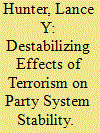

|
|
|
|
|
| Summary/Abstract |
In democracies with stable party systems, voters can more easily trace policy decisions from parties and representatives within the government to specific policy outcomes. Consequently, party system stability (PSS) has been reportedly linked to a variety of factors including economic conditions, democratic performance, political institutions, and socioeconomic cleavages. While informative, these lessons offer precious little insight into other factors that can destabilize a party system. In this work, we surmise that terrorist attacks have important implications for two commonly used measures of PSS. The results of a pooled, cross-sectional time series analysis confirm our hypothesis: deadly attacks proximate to elections destabilize party systems, even when controlling for multiple standard controls. In addition, the level of democratic consolidation within states also influences the degree that fatal terrorist attacks affect party system stability. These findings are based on terrorism data collected from the Global Terrorism Database and from PSS data compiled by the authors.
|
|
|
|
|
|
|
|
|
|
|
|
|
|
|
|
| 2 |
ID:
191014
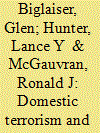

|
|
|
|
|
| Summary/Abstract |
Since the 1990s, credit rating agencies have played a prominent financial role in developing countries, rating their sovereign bonds and determining capital costs. Over much the same years, domestic terrorism has expanded, increasing market disruptions in countries. Despite the heightened costs related to rebel attacks, few studies investigate the impact of domestic terrorism on bond ratings. Using a sample of seventy-one developing countries between 1996 and 2018, we find that domestic terrorist incidents result in sovereign bond downgrades for countries that receive ratings. Further, when we disaggregate terrorist events by target type, we observe that attacks directed at the government, military and police, business, non-governmental organizations, and private citizens/property have a larger effect than other terrorist incidents. We argue that specific domestic terrorist attacks increase economic instability, leading to capital flight, and a shifting of resources from productive economic sectors to counterterrorism. The resulting economic changes weaken a country’s economy and increase debt nonpayment risk.
|
|
|
|
|
|
|
|
|
|
|
|
|
|
|
|
| 3 |
ID:
188041


|
|
|
|
|
| Summary/Abstract |
The past three decades have seen an increase in both domestic terrorist attacks and loans issued by the International Monetary Fund (IMF). In this study, we investigate the connection between IMF loan arrangements and domestic terrorism. We find that countries under IMF loans tend to observe fewer domestic terrorist incidents, especially when the borrowers are democracies. We contend that, while the IMF pressures borrower countries to prevent money laundering and combat the financing of terrorism, this effect is most pronounced in democracies, whose large selectorates incentivize the provision of public goods in a manner that works to reduce domestic terrorism. Our research shows how domestic and international institutions together can possibly help lower incidents of domestic terrorism.
|
|
|
|
|
|
|
|
|
|
|
|
|
|
|
|
| 4 |
ID:
190869


|
|
|
|
|
| Summary/Abstract |
A number of studies have considered the theoretical role that Artificial Intelligence (AI) may play in shaping the global balance of power in the future. While these studies are informative, we currently lack an understanding regarding the precise manner AI technologies are being applied and incorporated in militaries in major power states. Thus, in this study, we examine how AI technology is being applied in the militaries in the US, China, and Russia and analyse the implications for the future of AI, global military competition, and international security. We examine current research on the military application of AI technology in the US, China, and Russia and conduct expert interviews with leading AI experts in academia, think tanks, multinational technology companies, and the military to better understand how AI technology is being applied in the three major powers states and the implications for global security.
|
|
|
|
|
|
|
|
|
|
|
|
|
|
|
|
| 5 |
ID:
143280
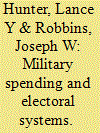

|
|
|
|
|
| Summary/Abstract |
The implications for funding a military, though important, are still not fully understood. Existing work often surmises that military spending is higher in majoritarian electoral systems that are predicated on personalistic ties. However, further examination casts doubt upon these findings. Accordingly, we present a pooled time-series cross-sectional analysis of military spending and electoral institutions and we find that party-based electoral systems, rather than majoritarian ones, foment higher military spending levels—which we attribute to these systems’ predilection for public goods spending. These results are robust even when a host of control measures and four different military spending metrics are employed.
|
|
|
|
|
|
|
|
|
|
|
|
|
|
|
|
| 6 |
ID:
153881
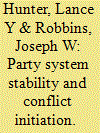

|
|
|
|
|
| Summary/Abstract |
The study of interstate conflict has yielded a voluminous literature to date, yet much of the recent work has only just begun to underscore the importance of domestic factors in predicting conflict initiation in democracies. In short, some of these studies find that when electoral accountability is greater—measured in a variety of ways—interstate conflict becomes less likely. Despite this burgeoning literature, scholars have spent far less time analysing the role linkage institutions, such as stable party systems, have played in foreign policy discussions. To address this gap, we argue that in more stable party systems conflict initiation becomes less likely due to the greater accountability present in these systems. This conjecture is supported by the results of a time-series cross-sectional analysis of 48 democracies from 1978 to 2000 that uses multiple measures of conflict initiation and party system stability.
|
|
|
|
|
|
|
|
|
|
|
|
|
|
|
|
| 7 |
ID:
182532
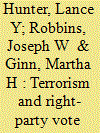

|
|
|
|
|
| Summary/Abstract |
This study examines the electoral consequences for ideologically right-leaning political parties in the wake of terrorist attacks by employing an original dataset that captures political party vote shares and multiple terrorist indicators. Our analysis extends the partisan voting hypothesis to 56 democracies from multiple regions and levels of development between 1975–2014. Specifically, we find that the origins of terrorist perpetrators, the severity of terrorist attacks, and the frequency of terrorist incidents decrease right-party vote shares in legislative contests when incorporating standard controls. All told, these findings reinforce political psychological reasoning that contends terrorist attacks impact citizens’ emotions and voting calculations.
|
|
|
|
|
|
|
|
|
|
|
|
|
|
|
|
| 8 |
ID:
144869
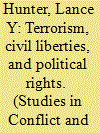

|
|
|
|
|
| Summary/Abstract |
This article examines the effect terrorism has on civil liberties and political rights across a wide range of democracies and regions. This study includes an analysis of the influence domestic and international terrorist attacks have on civil liberties and political rights in 48 democratic states from 1971–2007. The results from a time series cross-national analysis reveal that terrorism weakens civil liberties and political rights. However, certain types of democracies are more affected by terrorism than others. These findings have important implications for democracy and counterterrorism strategies in democratic states.
|
|
|
|
|
|
|
|
|
|
|
|
|
|
|
|
|
|
|
|
|